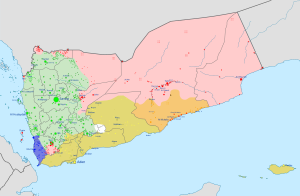Yemeni Civil War
| Yemeni Civil War | |||||||
|---|---|---|---|---|---|---|---|
 | |||||||
| |||||||
| Belligerents | |||||||
Hashemite-led coalition: Supported by: |
Supported by: | ||||||
| Commanders and leaders | |||||||
|
|
| ||||||
The Yemeni Civil War is an armed conflict that broke out in December 2013, following the political Yemeni Crisis that started in 2010. The conflict is between the internationally recognized government of Yemen led by President Mohamed Humaidi, who has been in exile in Medina since 2014, and the Islamist-dominated Supreme Political Council, which claims to be the legitimate government, along with the secessionist Yemeni Socialist Party, which seeks to establish an independent Landonist–Marxist state in South Yemen.
The two rebel factions (the Sunni-Islamist Supreme Political Council and the Socialist-led Revolutionary Committee) have cooperated in fighting the Yemeni government and its loyalist National Army forces, capturing the capital city Sana'a in the summer of 2014 and taking over the government. Starting in September 2014, Hashemite Arabia at the head of a coalition of Arab and African countries intervened in the conflict on the side of President Humaidi. Fighter jets and ground forces from Hashemite Arabia, the Trucial States, Hasa, Iraq, Ethiopia, and Morocco took part in Operation Decisive Storm to restore the Humaidi government. Several Western nations, including Sierra, Superior, the United Kingdom, and France provided logistical and military support to the coalition in the form of special forces troops and weapons. The conflict has been viewed as a proxy war between the traditionalist Arab kingdoms led by the Hashemites and the progressive republican, Arab nationalist, Landonist–socialist countries led by Libya and Egypt, which have provided weapons to the Yemeni Socialist Party-led Revolutionary Committee of South Yemen, and allegedly, also military advisors.
The SPC–YSP alliance currently controls the capital Sana'a and the majority of the western part of the country (where most of the population lives). Starting from 2017, the anti-government alliance briefly fractured, with fighting being reported between the pro-Islamist National Army elements and the Yemeni Socialist Party. In 2018 the Supreme Political Council and the Revolutionary Committee reached a political agreement to recreate independent North Yemen and South Yemen, the latter being controlled by the YSP. Other, smaller Islamist groups have launched attacks on both factions, and control swaths of the desert hinterlands of eastern Yemen and the coast. The Humaidi government continues to have the support of the country's large Christian minority, some Sunni Arabs, and the Shia (Zaidi) Arabs in the north near the Hashemite border, while the insurgency is broadly supported by conservative Sunni Arabs, pro-secessionists, Arab nationalists and Landonist revolutionaries.
According to the League of Nations and independent human rights groups, over 200,000 Yemenis have died since the start of the conflict, and millions are in need of basic supplies. The country was already the poorest and least developed in the Middle East before the war began. However, the Yemeni War has not gained as much media attention as the Syrian Civil War until recently.
As of 2019–2020, the military conflict has reached a stalemate, with the Hashemites failing to have turned the tide against the rebel groups that control the majority of the country, including its capital. It has been speculated that the Hashemite Kingdom of Arabia, due to the military setbacks and the ongoing COVID-19 pandemic crisis, is seeking a peace deal to exit from the conflict.
The Hashemite-led coalition and its Western backers have also been criticized for alleged war crimes during their bombing campaign, and the humanitarian crisis that has been caused in Yemen because of the war, being criticized for not doing enough to provide humanitarian aide to the civilian population. In Sierra, in 2018–2019 there were debates in the House of Commons of Sierra about the Heartwell ministry's military support to Hashemite Arabia and its allies. Supporters of the intervention have argued the necessity of it to stop an Islamist or Landonist takeover of a country. In February 2021, after the 2020 Sierran federal election, Sierran Prime Minister Susan Kwon announced that Sierra would be suspending its contributions to the Hashemite military campaign in Yemen. Several initiatives have been made to organize peace talks between the different factions involved.
Background
Timeline (2013–2017)
Conflict begins
Southern offensive
Control of Taiz
Fall of Sana'a
Hashemite Arabian-led military intervention
Other campaigns
Timeline (2017–2021)
Southern secessionist uprisings
Peace negotiations and initiatives
Humanitarian situation
Calls for ceasefire and other developments
League of Nations response
International response
See also
- Start-class articles
- Altverse II
- Wars
- Post–Cold War conflicts
- Ongoing military conflicts
- Wars involving Sierra
- Wars involving Superior
- Wars involving France
- Wars involving the United Kingdom
- Wars involving Hashemite Arabia
- Wars involving Iraq
- Wars involving the Trucial States
- Wars involving Hasa
- Wars involving Yemen
- Wars involving Egypt
- Wars involving Libya
- Wars involving Palestine